This is a comprehensive comparative article on McKinsey vs. BCG.
Choosing between McKinsey & Company and Boston Consulting Group (BCG) can be pivotal for an aspiring strategy consultant.
Both firms are renowned for their influential role in the management consulting industry and offer highly rewarding career paths.
This article comprehensively compares McKinsey and BCG (two of the MBB firms), examining the following comparison criteria:
- Service and sector specializations
- Organizational structure
- Culture
- Compensation & benefits
- Prestige
- Hiring process and interview styles
- Exit opportunities and alumni network.
Whether you’re a recent graduate targeting a career in consulting or a seasoned professional considering a switch, understanding the nuances between these two giants will help you make an informed decision that aligns with your career aspirations and values.
So, if you are wondering what the best firm is for you, this article is for you.
Table of Contents
McKinsey vs BCG: Key Takeaways
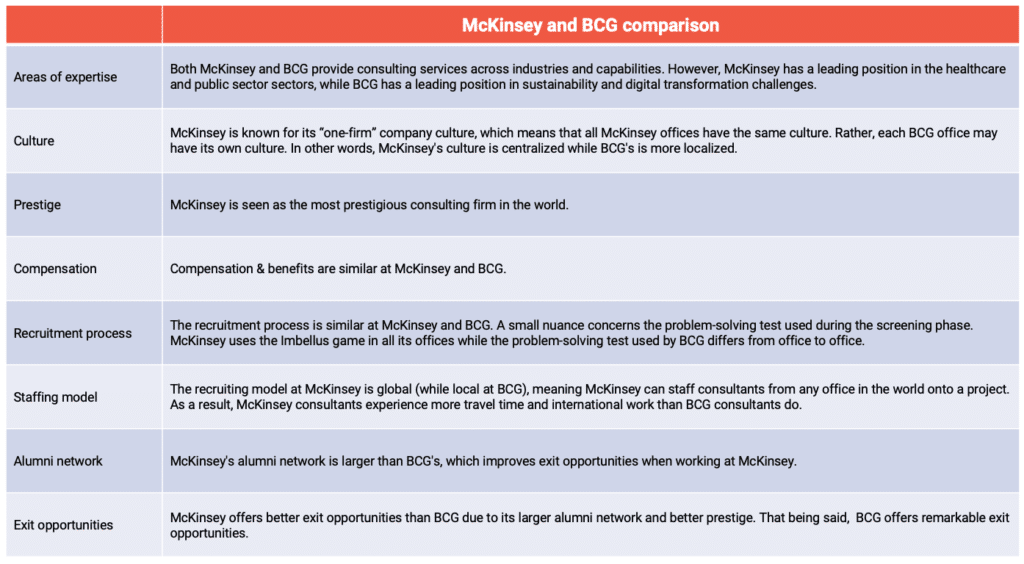
Overview of McKinsey & Company and Boston Consulting Group (BCG)
McKinsey & Company and BCG are two of the most prestigious consulting firms.
McKinsey, founded in 1926, has become synonymous with top-tier consulting. It is known for its rigorous approach to solving complex business problems across various industries.
BCG, established in 1963, offers a slightly different prestige, pioneering the concept of business strategy, and is known for its innovative solutions and emphasis on enabling companies to grow and outcompete.
Both consulting firms operate globally, with offices on multiple continents.
They serve clients ranging from multinational corporations to government entities and non-profits.
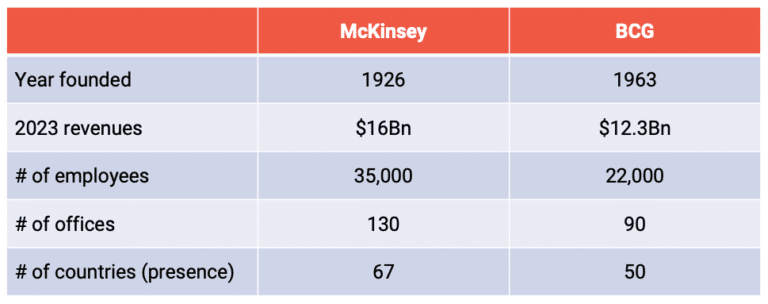
Services and Sector Specializations
McKinsey & Company and Boston Consulting Group offer a broad spectrum of services, though each firm has distinct areas of specialization that reflect their unique strategies and philosophies.
McKinsey prides itself on its deep expertise across sectors such as healthcare, financial services, and public and social sectors, providing services that range from corporate finance and strategy to operations and digital transformation.
On the other hand, BCG is highly regarded for its innovation-driven approach, particularly strong in technology and digital industries, sustainability practices, and consumer goods.
Both firms offer bespoke services designed to address the specific challenges of each sector, leveraging their global insights and extensive research capabilities to deliver measurable outcomes.
This diversity in service offerings underscores the firms’ adaptability to the evolving business landscape and their commitment to driving substantial impact wherever they operate.
McKinsey's Core Industry Practices
McKinsey & Company is distinguished by its comprehensive expertise across several key industries.
It delivers transformative insights in sectors like banking, pharmaceuticals, and advanced electronics, where it often sets the pace for innovation and operational excellence.
The firm’s approach integrates cross-sectoral knowledge to create holistic solutions that drive sustained growth and competitive advantage for its clients.

BCG’s Areas of Specialization
Boston Consulting Group (BCG) shines in industries where innovation and strategic transformation are critical.
It leads in digital ventures, sustainability, and consumer insights, helping businesses adapt to and shape market trends.
BCG’s dedication to thought leadership and sector-specific strategies enables clients to pioneer new products and services that resonate deeply with today’s eco-conscious and tech-savvy consumers.
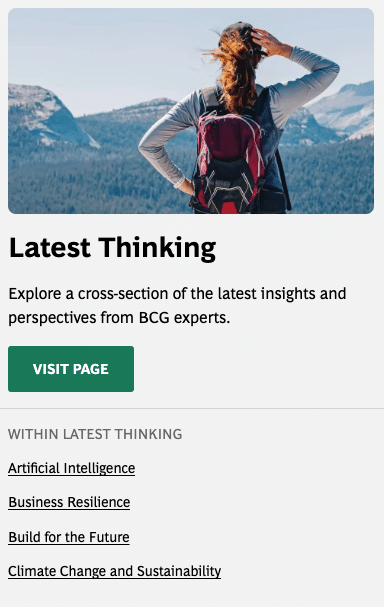
Consulting Services Offered by McKinsey
McKinsey’s service offerings encompass many consulting needs, from quantitative analytics and business model restructuring to talent management and change leadership.
Its ability to combine high-level research with actionable insights allows clients to implement complex solutions efficiently and effectively.

BCG’s Consulting Frameworks and Tools
BCG is renowned for its distinctive frameworks and tools that facilitate client success, including the BCG Matrix and SMART simplicity.
These tools provide a structured approach to decision-making, emphasizing sustainable growth, market share expansion, and operational efficiency.
BCG’s commitment to developing proprietary methodologies underlines its role as a catalyst for client transformation.
Impact of Sector-Specific Services on Client Success
Both McKinsey and BCG have profoundly impacted their clients’ success, albeit through different approaches.
McKinsey’s emphasis on rigorous problem-solving and industry-specific knowledge ensures that solutions are deeply integrated into the client’s operational fabric.
BCG’s focus on disruptive strategy and innovation propels its clients to the forefront of their industries, often leading to market leadership and increased shareholder value.
Organizational Structure and Culture
Core Values and Ethos at McKinsey
McKinsey’s corporate culture is rooted in a deep commitment to professionalism and client confidentiality, emphasizing the importance of ‘up-or-out’ policies—promoting only top performers while encouraging others to find opportunities outside the firm.
This creates a highly competitive environment that drives individuals to excel.
McKinsey fosters a culture where analytical rigor and strict adherence to ethical standards are paramount, positioning itself as an elite advisor to the world’s leading businesses.
BCG's Collaborative Approach
In contrast, BCG promotes a more open and collaborative culture.
It emphasizes diversity of thought and an adaptive approach to leadership and problem-solving.
BCG’s work environment is often described as supportive and dynamic, focusing on teamwork and sustainable development.
This culture nurtures innovation and creative solutions, encouraging consultants to take initiative and lead projects with high autonomy.
Professional Development Opportunities
Professional growth at McKinsey is structured and precise, with clear benchmarks for performance and advancement.
This ensures that all consultants continuously develop their skills in a highly structured environment (McKinsey publicly communicates its $800m annual expenses on development programs for its staff).
Conversely, BCG offers a more flexible career path, allowing employees to pursue areas that interest them the most, fostering a personalized growth journey that can lead to diverse and specialized career trajectories.
Work-Life Balance and Company Policies
Work-life balance is challenging in consulting, but both firms address this differently.
McKinsey’s approach tends to be more traditional, with a strong focus on client deliverables, which can lead to longer working hours.
BCG tries to mitigate the demanding nature of consultancy, reflecting a more modern take on employee wellness and balance.
Note: Work-life balance can be challenging for any consulting firm (including Bain or other firms).
Engagement and Decision-Making Styles
Decision-making at McKinsey is often highly structured, relying on hierarchical and time-tested methods to ensure consistency and reliability in client engagements.
BCG, however, promotes a less hierarchical structure, allowing younger consultants more opportunities to influence projects and decisions.
This empowers younger team members and infuses fresh perspectives into their consulting practices.
Hierarchical Structure
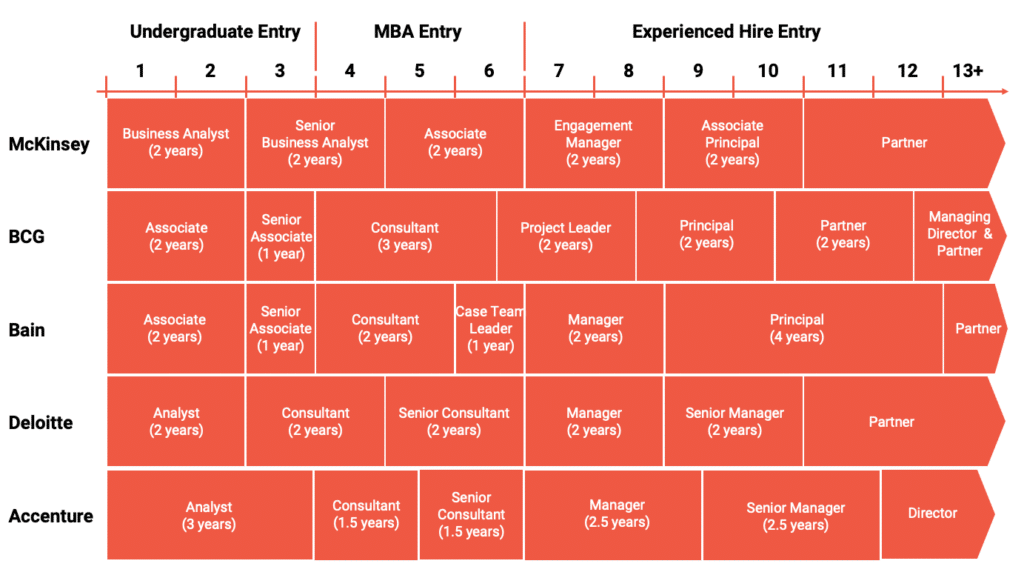
At McKinsey, career progression follows a well-defined path from Analyst to Partner, with clear criteria for each promotion.
The firm’s up-or-out policy ensures that only those who continuously demonstrate superior performance and potential move up, which creates a highly competitive but rewarding environment.
BCG offers a somewhat more flexible career path, allowing for lateral movements and role changes based on personal interests and market needs.
This adaptability allows employees to explore different sectors and functions, fostering a more personalized career journey.
When we delve deeper into their hierarchical structures, McKinsey’s is more traditional and formal. The primary roles within McKinsey’s hierarchical structure consist of:
Business Analyst
Senior Business Analyst
Associate
Engagement Manager
Associate Partner
Partner
Senior Partner
In contrast, BCG has a flatter and more collaborative organization.
The hierarchy at BCG encompasses roles such as:
Associate
Senior Associate
Consultant
Project Leader
Principal
Partner
Senior Partner
As employees advance through the hierarchy, their responsibilities expand, with more senior positions entailing oversight of project operations and client engagements.
Related article: top consulting firms.
Get 4 Complete Case Interview Courses For Free

You need 4 skills to be successful in all case interviews: Case Structuring, Case Leadership, Case Analytics, and Communication. Join this free training and learn how to ace ANY case questions.
Compensation and Benefits
McKinsey and BCG are recognized for their highly competitive compensation and benefits packages.
The salaries at these prominent consulting firms are exceedingly competitive, with minimal variance between them.
McKinsey is known for its competitive compensation packages, which include substantial base salaries, performance bonuses, and various long-term incentives.
These packages are designed to attract and retain top talent and reflect the firm’s commitment to excellence.
BCG also offers competitive salaries but emphasizes comprehensive benefits and perks, including superior health benefits, family leave policies, and travel stipends.
This holistic compensation approach supports its consultants’ professional and personal well-being.
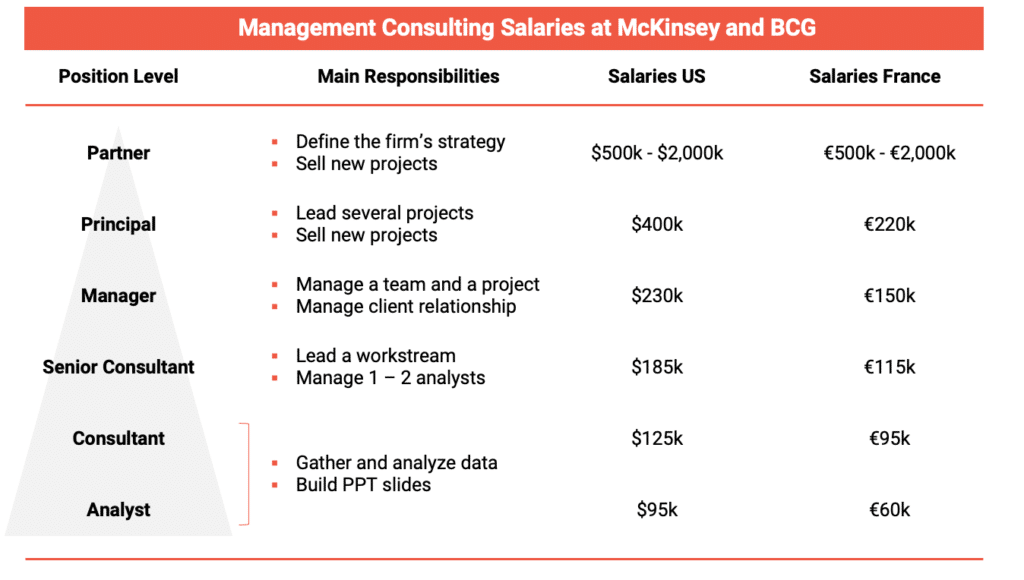
Related article: I’ve written a comprehensive article about salaries in top consulting firms. In this article, you’ll find the exact compensation package per level and for different geographies. Click here to read this article.
Hiring process and interview styles
McKinsey and BCG are acclaimed for their rigorous and thorough recruitment and selection processes.
They are among the most challenging firms to enter, with their stringent selection criteria and multi-stage interviews.
McKinsey's application process and interview style
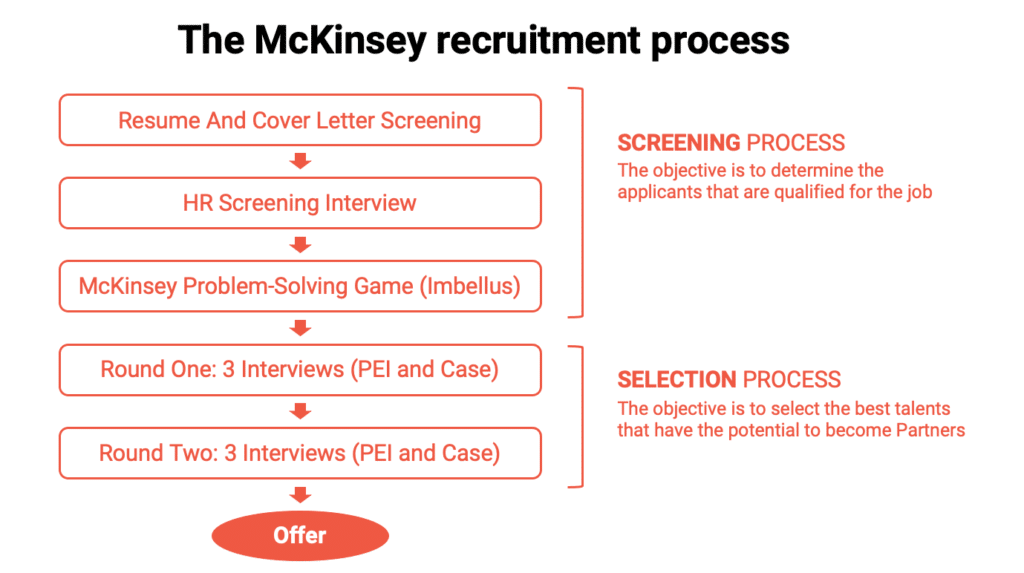
McKinsey’s interview process is designed to be exceptionally rigorous, aiming to identify candidates who excel analytically and demonstrate significant leadership and interpersonal skills.
The process typically begins with a resume and cover letter review, followed by a problem-solving game (the Imbellus game), which assesses logical thinking.
Those who advance face a sequence of case interviews, each structured to simulate real consulting problems and test the candidate’s ability to analyze, calculate, and present solutions under pressure.
These case interviews are complemented by personal experience interviews that probe into the candidate’s past experiences to unearth evidence of personal impact, entrepreneurial spirit, and the ability to adapt to complex situations.
McKinsey interviewers are often senior consultants with deep insights into what makes a successful consultant at their firm.
This ensures that each candidate is evaluated against the highest performance standards and fit for the firm’s distinctive culture.
Related articles:
Finally, check our McKinsey hub to find all the resources you need to secure a McKinsey offer.
BCG's application process and interview style
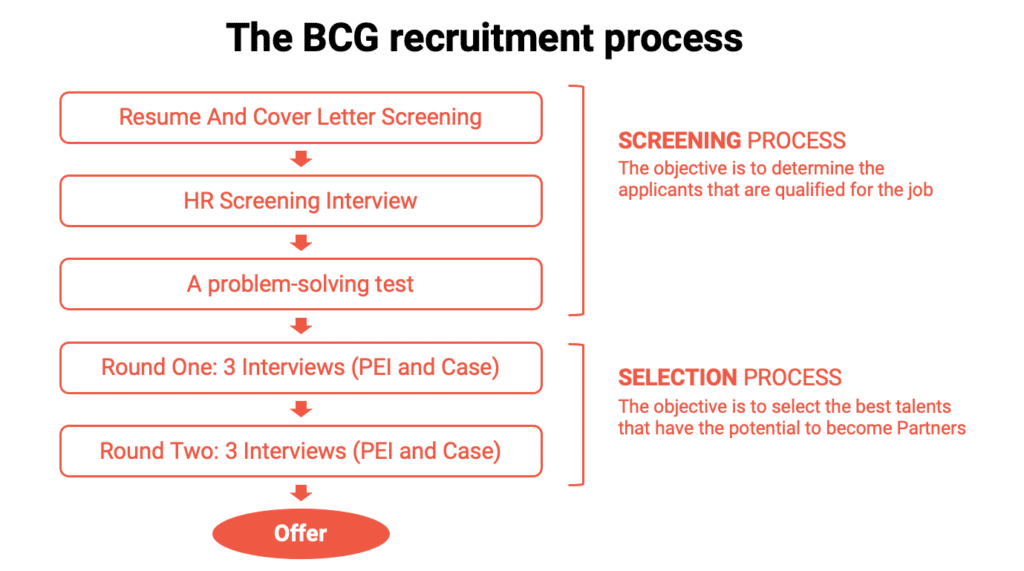
BCG’s approach to evaluating candidates focuses heavily on creativity, strategic thinking, and the potential for driving innovation.
While the initial stages are similar to McKinsey’s, involving a screening of resumes and cover letters, BCG places a significant emphasis on how candidates perform in case interviews that are less structured and more ambiguous, reflecting real-world complexities.
These interviews are designed to assess analytical capabilities and problem-solving skills but focus more on the candidate’s ability to think divergently, approach problems uniquely, and propose innovative solutions.
Additionally, BCG includes fit interviews that evaluate a candidate’s alignment with the firm’s values, such as integrity, diversity, and social impact.
Various staff members, from senior consultants to partners, typically conduct the interview process, giving candidates multiple perspectives on BCG’s working style and culture.
This comprehensive approach ensures that BCG selects candidates capable of excellent analytical work and those who will thrive in a culture that values thought leadership and collaborative problem-solving.
Related articles:
An interview with BCG’s former Project Leader
Finally, check our BCG hub to find all the resources you need to secure a BCG offer.
Case Interviews: interviewer-led vs candidate-led interviews
Case interviews form a critical part of the selection process for both McKinsey and BCG.
These consulting interviews differ in their approach:
BCG employs interviewee-led case interviews, in which the candidate takes charge of structuring and leading the case analysis.
On the other hand, McKinsey utilizes interviewer-led case interviews, in which the interviewer pre-structures the case and then guides the candidate through the process.
Adequate preparation is critical to acing these case interviews.
Therefore, check out our free case interview training. This course will show you how to navigate the four Cs of case interviews.
Get 4 Complete Case Interview Courses For Free

You need 4 skills to be successful in all case interviews: Case Structuring, Case Leadership, Case Analytics, and Communication. Join this free training and learn how to ace ANY case questions.
Exit Opportunities and Alumni Network
As their careers advance, consultants at McKinsey and BCG often reach a juncture where they begin to consider their next moves.
In these scenarios, attractive exit opportunities and the strength of the alumni network become crucial deciding factors in choosing between McKinsey BCG and Bain.
McKinsey is widely acknowledged for having the most favorable exit opportunities, a reputation that can be ascribed to its esteemed status and extensive network across various industries.
Conversely, BCG has specific regional strengths and a focus on innovation, which may impact the types of exit opportunities available to their consultants.
Both McKinsey and BCG boast strong alumni networks.
McKinsey’s alumni network is the most extensive among all MBB firms, offering significant advantages for individuals pursuing opportunities after their consulting careers.
BCG also boasts a substantial alumni network renowned for its innovation and digital transformation expertise.
Exit Opportunities
Consultants from McKinsey and BCG can expect a wide range of exit opportunities, including roles in:
Strategy work
Operations
Business development
Corporate development
Product
Marketing
Private Equity
Hedge funds
Regardless of whichever firm they choose, having McKinsey or BCG on their resume opens a world of opportunities.
Read this article detailing the exit opportunities (with salaries) after a career at McKinsey or BCG.
Alumni Network
MBB consultants benefit from an extensive alumni network, enabling easier career progression.
Regarding the alumni network, McKinsey boasts a sizable network with thousands of members spread across the globe.
They support their alumni network through their Alumni Center, which facilitates ongoing engagement among alumni and with the firm.
The McKinsey and BCG alumni networks have led to noteworthy collaborations and partnerships, setting the stage for enduring relationships and future opportunities.
BCG supports its alumni network by offering resources to enhance connections, facilitate networking, and encourage the exchange of ideas within the BCG community.
Notable McKinsey alumni include Sundar Pichai, CEO of Alphabet (Google, YouTube, etc.), James Gorman, CEO of Morgan Stanley, and Sheryl Sandberg, COO of Facebook. BCG’s distinguished alumni include Steve Hafner, CEO of Kayak, Indra Nooyi, CEO of Pepsi, and Jeff Jordan.
Related article: how to network with consultants.
McKinsey vs BCG: Frequently Asked Questions
Is BCG more prestigious than McKinsey?
Both McKinsey & Company and BCG are highly prestigious management consulting firms, and their prestige can vary based on factors such as industry reputation and individual experiences.
Here is a screenshot from Vault’s ranking of top consulting firms:


How much does McKinsey pay compared to BCG?
McKinsey and BCG offer highly competitive compensation packages, but subtle differences exist.
Generally, McKinsey might edge out slightly higher salaries, particularly at the entry and mid-career levels, consistent with its prestige and rigorous demands.
While also offering robust salaries, BCG often focuses more on comprehensive benefits and work-life balance enhancements.
Both firms provide performance bonuses and various long-term incentives, ensuring total compensation is competitive and aligned with the market’s top tier.
The exact figures can vary based on role, experience, and geographical location, but both firms are known for generously rewarding their talent.
Check this article for a detailed analysis of salary differences between these two consulting firms.
How do you compare McKinsey and BCG?
Comparing McKinsey and BCG involves looking at several key dimensions, such as culture, service offerings, career opportunities, and client engagement strategies.
McKinsey, known for its structured, data-driven approach, maintains a traditional and highly competitive environment with a clear “up-or-out” policy.
In contrast, BCG promotes a more dynamic and innovative atmosphere, emphasizing collaboration and adaptability, and strongly emphasizes work-life balance.
While both firms offer vast global reach and diverse industry services, their distinct corporate cultures and approaches to consulting might attract different types of talent depending on individual career goals and personal values.
How does the application process of McKinsey and BCG differ?
The application processes of McKinsey and BCG are similar in their rigor and style.
Both involve multiple rounds of case interviews and analytical assessments.
It emphasizes problem-solving skills, analytical ability, strategic thinking, and personal impact through well-defined interview stages.
This method tests candidates under pressure to assess their capability to handle the consulting workload.
How does the staffing model of McKinsey and BCG differ?
McKinsey and BCG have distinct staffing models that reflect their respective organizational cultures and strategic approaches.
McKinsey uses a global staffing model, meaning consultants can be staffed on projects worldwide, depending on their expertise and the client’s needs.
This model supports broad exposure to various industries and practices, enhancing the consultant’s learning curve and global insight.
However, it can lead to more travel and less predictability in work-life balance.
In contrast, BCG typically employs a local staffing model, preferring to align consultants with projects closer to their home base.
This model reduces travel requirements, fosters better work-life balance, and allows consultants to build deeper relationships and networks within their local business community.
Both models have their merits and challenges, with McKinsey focusing on global expertise and BCG emphasizing regional depth and personal work-life balance.
McKinsey vs BCG: final thoughts
In conclusion, McKinsey and BCG are prestigious consulting firms offering many opportunities for MBB consultants.
They provide a wide range of services, cater to an impressive list of clients, and offer competitive compensation packages and exit opportunities.
Candidates should consider their long-term career goals, personal values, and desired work culture when choosing between McKinsey and BCG.
Each firm offers a distinct path and environment that can significantly influence professional growth and personal satisfaction.
That’s why understanding each firm’s strengths and offerings will help you make an informed decision that best matches your aspirations and lifestyle, ensuring a fulfilling and successful career in consulting.
If you want an article comparing MBB firms with boutique consulting firms, leave a comment now.
Or, if you prefer an article comparing McKinsey BCG and Bain (or other consulting firms), say it in the comment section below.
In conclusion, tell me which consulting firm you prefer after reading this article.
Get 4 Complete Case Interview Courses For Free

You need 4 skills to be successful in all case interviews: Case Structuring, Case Leadership, Case Analytics, and Communication. Join this free training and learn how to ace ANY case questions.

Very informative post I really like it. Happy to hear about it more.